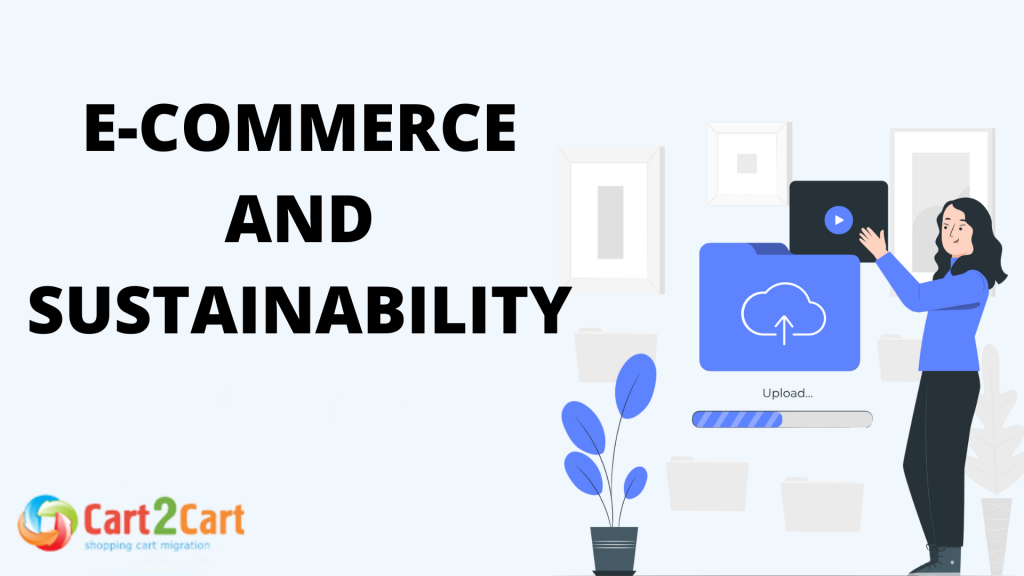
E-commerce, short for electronic commerce, is the buying and selling of goods and services over the internet. This form of business has transformed the way consumers shop and businesses operate. With the rise of technology and online platforms, ecommerce has become increasingly popular, allowing companies to reach a global audience and customers to shop from the comfort of their own homes. From online retail stores to digital downloads, e-commerce encompasses a wide range of transactions and continues to grow as technology advances. In this article, we will explore the various aspects of e-commerce, including its impact on traditional retail, the different types of ecommerce businesses, and the key factors for a successful e-commerce operation. Whether you are a business owner looking to expand into the digital realm or a consumer curious about the e-commerce landscape, this article will provide valuable insights into this ever-evolving industry
Why is Sustainability Important for Online Retailers?
Sustainability is increasingly important for online retailers due to the growing demand for sustainable products and the significant impact of consumer habits on the environment. As consumers become more aware of the environmental implications of their purchases, they are actively seeking out eco-friendly and ethically sourced products. This shift in consumer behavior has created a market for sustainable goods, and online retailers must adapt to meet this demand in order to remain competitive. Adopting sustainable practices offers numerous benefits for ecommerce companies. By offering sustainable products, online retailers can attract environmentally conscious consumers and gain a competitive edge in the market. Additionally, embracing sustainability can reduce an ecommerce company's environmental impact, such as minimizing waste and carbon emissions from shipping processes. Moreover, incorporating sustainable practices can enhance a company's brand image, positioning them as responsible and socially conscious, which can ultimately lead to increased customer loyalty and positive brand recognition. In conclusion, sustainability is crucial for online retailers as it allows them to meet consumer demands, minimize environmental impact, and strengthen their brand image in an increasingly environmentally aware marketplace.
Carbon Footprint of E-Commerce Businesses
In today's digital age, e-commerce businesses have become an integral part of the global economy, offering convenience and accessibility to consumers. However, the rise of online shopping has also brought about increased environmental concerns, particularly in the form of carbon emissions. This article will explore the carbon footprint of ecommerce businesses, examining the ways in which online retail contributes to greenhouse gas emissions and the environmental impact of packaging, shipping, and returns. We will also discuss potential solutions and initiatives that e-commerce businesses can implement to reduce their carbon footprint and contribute to a more sustainable future. Understanding and addressing the environmental impact of ecommerce is crucial in mitigating the harmful effects of online retail on the planet.

The Growing Impact on the Environment
The growing impact of e-commerce on the environment is evident through the significant increase in carbon emissions, waste production, and the depletion of natural resources. The rise in online retail has led to an increase in delivery vehicles on the roads, contributing to a significant increase in carbon emissions. The excessive packaging and single-use materials used in e-commerce also add to the mounting waste production, further straining landfills and ecosystems. Additionally, the extraction of natural resources to produce goods and packaging for online sales has put a strain on the environment, leading to deforestation and habitat destruction. As a result of these concerning environmental impacts, the e-commerce industry is now recognizing the need for sustainable solutions. Companies are beginning to implement eco-friendly packaging, reduce their carbon footprint through efficient logistics, and adopt fair trade standards to ensure the ethical and sustainable sourcing of products. This shift towards sustainability is essential in mitigating the negative impact of e-commerce on the environment and is a step in the right direction towards a more environmentally friendly industry.
Ways to Reduce the Carbon Footprint of an Online Business
There are several ways to reduce the carbon footprint of an online business by implementing sustainable practices. One way is to use recycled materials for packaging, which helps to reduce waste and minimize the need for new resource extraction. Additionally, optimizing order and returns management processes can reduce unnecessary transportation and packaging, further decreasing the environmental impact. Transitioning to circular models, such as offering product repair and recycling programs, can also contribute to a more sustainable business. This allows for the reuse of materials and minimizes waste. Energy efficiency is another key factor, as using renewable energy sources and reducing energy consumption can significantly lower carbon emissions. Waste management is important, and online businesses can strive to minimize packaging waste and properly dispose of any unavoidable waste. Ethical sourcing practices are vital, as well, as they ensure that products are obtained in a sustainable and responsible manner. Lastly, corporate responsibility plays a crucial role in the overall environmental and social impact of a business. By prioritizing sustainable practices and transparency, online businesses can work towards reducing their carbon footprint and contributing to a healthier planet.
Sustainable Practices in Online Shopping
Online shopping has become increasingly popular in recent years, resulting in a surge in packaging waste and carbon emissions from shipping. However, there are sustainable practices that can be implemented to mitigate the environmental impact of online shopping. Some companies are embracing eco-friendly packaging, using recycled materials and minimizing excess packaging. In addition, businesses are offering carbonneutral shipping options to reduce the carbon footprint of deliveries. Furthermore, consumers can make sustainable choices by opting for consolidated shipping, choosing products with minimal packaging, and supporting brands that prioritize sustainability. These practices not only reduce environmental harm but also contribute to a more sustainable future for online shopping.
Sustainable Products & Supplies
Reusable Water Bottles: Made from recycled materials and designed for multiple uses, these eco-friendly bottles reduce single-use plastic waste and support renewable resources. 2. Bamboo Toothbrushes: Crafted from sustainably sourced bamboo and nylon bristles, these toothbrushes are biodegradable and reduce plastic pollution while supporting renewable resources. 3. Recycled Paper Products: Items such as notebooks, stationery, and paper towels made from recycled paper reduce the demand for virgin materials and minimize deforestation. 4. Organic Cotton Clothing: Clothing made from certified organic cotton supports environmentally responsible farming practices, reduces chemical exposure, and promotes sustainable agriculture. 5. Solar-Powered Chargers: These chargers harness renewable energy from the sun, reducing the reliance on traditional power sources and lowering carbon emissions. Using sustainable products and supplies not only aligns with green practices and environmentally responsible sourcing but also helps reduce the carbon footprint and minimize resource depletion. These eco-friendly products support sustainability efforts by promoting renewable resources, reducing waste, and encouraging responsible production practices. By choosing sustainable options, individuals and businesses can contribute to a healthier planet and a more sustainable future for generations to come.
Recyclable Packaging and Shipping Methods
Implementing sustainable shipping and using recyclable packaging methods in your business can greatly reduce your environmental impact. Start by using recyclable materials for packaging, such as cardboard, paper, and biodegradable plastics. You can also reduce packaging by using minimalistic designs and avoiding unnecessary packaging materials. Explore eco-friendly programs from major carriers that offer carbonneutral shipping options and use renewable energy sources. To further minimize environmental impact, provide clear product descriptions and sizing information to minimize returns. This can help reduce the need for additional packaging and transportation, ultimately reducing carbon emissions. By implementing sustainable shipping and recyclable packaging methods, you can demonstrate your commitment to environmental stewardship while also appealing to eco-conscious consumers.
Single-Use Plastic Alternatives for Shipping & Packaging Waste Reduction
In an effort to reduce single-use plastic waste from shipping and packaging, it is important to consider sustainable alternatives. Recycled cardboard is a great option for packaging materials, as it is sturdy, environmentally friendly, and can be easily recycled again after use. Biodegradable packaging options, such as compostable plastics or cardboard made from sustainable sources, are also becoming increasingly popular for their minimal environmental impact. Offering a "no-frills" shipping option to customers is another important step in reducing packaging waste. This allows customers to opt out of receiving extras like promotional material and product literature, which often end up in the trash. By giving customers the choice to receive only the necessary packaging materials, businesses can significantly minimize their environmental footprint. By utilizing these sustainable packaging materials and offering a "no-frills" shipping option, businesses can not only reduce single-use plastic waste, but also promote a more sustainable shopping experience for their customers. This small change in packaging practices can have a big impact on the environment and help create a more eco-friendly future.

Eco-Friendly Product Descriptions and Labeling
Introducing our new line of eco-friendly products, designed with sustainability in mind. Our packaging is made from recycled cardboard, ensuring that we are minimizing our environmental impact by reducing the need for new materials. The packing tape we use is biodegradable, meaning it will break down over time, further reducing waste and pollution. Additionally, our mailers are compostable, meaning they can be discarded with food scraps and yard waste, breaking down naturally into nutrient-rich soil. Our commitment to sustainable packaging is in line with our goal of reducing our reliance on virgin plastics and chemical-heavy materials. By choosing eco-friendly packaging, you are not only supporting a more sustainable and healthier planet, but you are also contributing to the reduction of waste and the preservation of natural resources for future generations. We believe that small changes, such as using sustainable packaging, can make a big impact on the environment. With our eco-friendly products, you can feel good about your purchase, knowing that you are supporting a more sustainable future. Join us in making a positive difference by choosing products with eco-friendly, sustainable packaging.
Optimizing Supply Chains for Environmental Sustainability
Companies can optimize their supply chains for environmental sustainability by implementing a variety of strategies and practices. These include incorporating recycling and reducing waste into their operations, as well as sourcing from renewable energy sources. One strategy is to create sustainable packaging and materials to reduce waste and promote recycling. Companies can also reduce emissions and energy consumption by incorporating renewable energy sources such as solar or wind power into their manufacturing and distribution processes. Additionally, they can implement sustainable sourcing practices to ensure that their products are produced in an environmentally responsible manner. Starbucks has successfully incorporated sustainable practices into their supply chain by offering reusable cups and recycling programs in their stores. They also work with suppliers who meet their ethical and environmental standards. Nike is another example of a company that has integrated sustainability into its supply chain by using recycled materials in their products and investing in renewable energy to power their operations. Overall, companies can optimize their supply chains for environmental sustainability by focusing on recycling, reducing waste, and using renewable energy sources, as demonstrated by companies like Starbucks and Nike.
Sustainable Business Models in E-Commerce Businesses
Sustainable business models in e-commerce are becoming increasingly important as companies strive to minimize their environmental impact. One key aspect of this is the emphasis on sustainable packaging, with many e-commerce businesses opting for biodegradable or recyclable materials. Consumer awareness is also crucial, as more and more customers prioritize sustainability when making purchasing decisions. E-commerce companies are responding to this by providing transparent information about their sustainable practices and the environmental impact of their products. Additionally, improving production processes is a major focus for sustainable ecommerce businesses. This includes reducing energy consumption, minimizing waste, and using eco-friendly materials in the manufacturing of products. The impact of sustainability on consumer purchasing decisions is significant, as many shoppers now actively seek out eco-friendly options and are willing to pay more for sustainable products. Successful sustainable e-commerce practices include companies like Patagonia, which has a strong focus on sustainable materials and ethical production processes in their online retail operations. Other examples include Reformation, known for their sustainable packaging and commitment to reducing their carbon footprint in ecommerce operations. These companies have effectively incorporated sustainable practices into their business models, which has resonated with environmentallyconscious consumers.
Benefits of Green Practices in E-Commerce Companies
In today's increasingly digital world, e-commerce companies have a unique opportunity to embrace green practices that not only benefit the environment but also their bottom line. By adopting sustainable strategies, e-commerce businesses can reduce their carbon footprint, attract environmentally conscious customers, and improve their overall operational efficiency. From reducing energy consumption in warehouses to using ecofriendly packaging materials, integrating green practices into their operations can lead to cost savings and a positive brand image. This shift towards more sustainable business practices not only benefits the environment but also provides e-commerce companies with a competitive edge in the market.
Increased Customer Satisfaction & Return Rate
Incorporating sustainable practices into your business model can significantly increase customer satisfaction and return rates. With over 50% of consumers expecting environmentally friendly delivery options and 60% believing that online retailers use excessive packaging, it is evident that customers are increasingly concerned about the environmental impact of their purchases. By implementing sustainable practices such as minimizing packaging, using eco-friendly materials, and offering green delivery options, businesses can meet these consumer expectations and improve their overall satisfaction. Furthermore, offering environmentally friendly delivery options can lead to a higher return rate as well. Studies have shown that 54% of consumers are willing to accept longer lead times and 20% are willing to pay more for environmentally friendly delivery. This means that by providing green shipping choices, businesses can attract more environmentally conscious customers who are likely to be satisfied with their purchase experience and return for future purchases. By addressing these consumer preferences and aligning with sustainable values, businesses can not only increase customer satisfaction but also cultivate a loyal customer base, ultimately leading to a higher return rate. Incorporating sustainable practices into the business model is not only beneficial for the environment but also for the bottom line.
Positive Impacts on Natural Resources and the Environment
Green e-commerce initiatives positively impact natural resources and the environment in several key ways. Firstly, by promoting sustainable packaging practices, e-commerce companies can significantly reduce the amount of waste generated from packaging materials, leading to a decrease in landfill waste and a more circular economy. Additionally, by implementing eco-friendly shipping options and optimizing delivery routes, these initiatives help lower carbon emissions associated with transportation and logistics, ultimately contributing to improved air quality. Furthermore, e-commerce companies can support reforestation efforts by partnering with organizations dedicated to planting trees and restoring natural habitats. By using ecofriendly materials for packaging, such as biodegradable or recyclable materials, and sourcing products from responsibly managed forests, these companies can help ensure the long-term sustainability of natural resources. In conclusion, green e-commerce initiatives have the potential to make a positive impact on natural resources and the environment by reducing waste, lowering carbon emissions, and improving air quality. By adopting sustainable packaging practices and supporting reforestation efforts, e-commerce companies can play a significant role in creating a more environmentally friendly and sustainable future
 E-commerce, short for electronic commerce, is the buying and selling of goods and services over the internet. This form of business has transformed the way consumers shop and businesses operate. With the rise of technology and online platforms, ecommerce has become increasingly popular, allowing companies to reach a global audience and customers to shop from the comfort of their own homes. From online retail stores to digital downloads, e-commerce encompasses a wide range of transactions and continues to grow as technology advances. In this article, we will explore the various aspects of e-commerce, including its impact on traditional retail, the different types of ecommerce businesses, and the key factors for a successful e-commerce operation. Whether you are a business owner looking to expand into the digital realm or a consumer curious about the e-commerce landscape, this article will provide valuable insights into this ever-evolving industry
E-commerce, short for electronic commerce, is the buying and selling of goods and services over the internet. This form of business has transformed the way consumers shop and businesses operate. With the rise of technology and online platforms, ecommerce has become increasingly popular, allowing companies to reach a global audience and customers to shop from the comfort of their own homes. From online retail stores to digital downloads, e-commerce encompasses a wide range of transactions and continues to grow as technology advances. In this article, we will explore the various aspects of e-commerce, including its impact on traditional retail, the different types of ecommerce businesses, and the key factors for a successful e-commerce operation. Whether you are a business owner looking to expand into the digital realm or a consumer curious about the e-commerce landscape, this article will provide valuable insights into this ever-evolving industry




